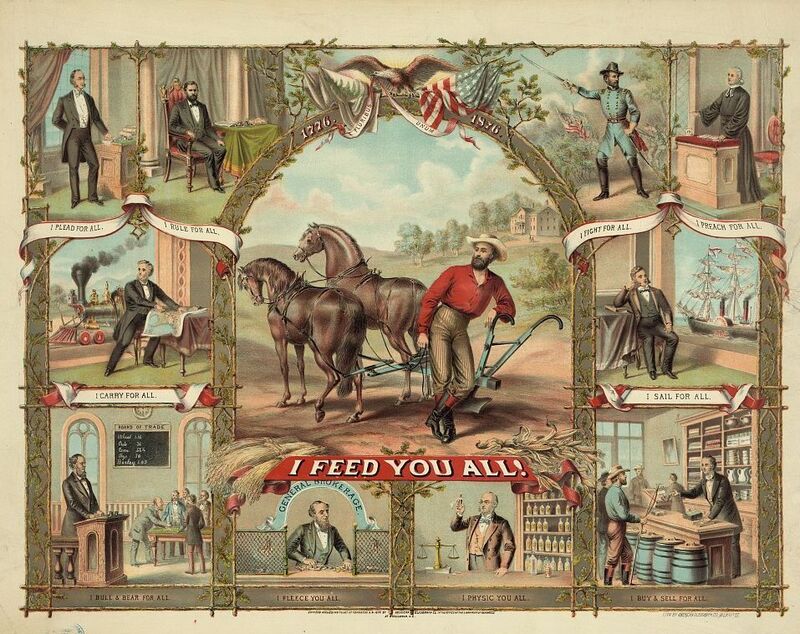National Grange (Order of the Patrons of Husbandry)

Among the most remarkable secret societies to emerge from the golden age of American fraternalism in the second half of the nineteenth century, the Patrons of Husbandry was launched in 1867 by Oliver H. Kelley, an employee of the federal Bureau of Agriculture, and six other men, mostly government clerks, who were concerned with the plight of small farmers after the American Civil War. Kelley was a Freemason, and the other founders were all either Masons or Odd Fellows; they felt that a fraternal secret society designed for farmers would provide them with a framework for cooperative action and mutual aid.
The Grange, as the organization has been called from the first, copied many of the standard features of other fraternal secret societies of the time. Local lodges, called Granges, confer four degrees of initiation, based on the four seasons of the agricultural year. Three higher degrees named after Greek and Roman goddesses of agriculture and plant growth are conferred by higher levels of the organization – the Degree of Pomona by county Granges, the Degree of Flora by state Granges, and the Degree of Demeter by the National Grange. The Degree of Demeter, a reconstruction of the ancient Eleusinian mysteries, was supposedly purchased by Kelley from an Italian nobleman who claimed to have access to the original rites of Eleusis; it is sufficiently pagan that nowadays many Christian members refuse to receive it.
Certain features of the Grange set it apart from most other fraternal orders of its time, however. At the urging of Kelley’s niece, Caroline Hall, the order admitted men and women on an equal basis, allowing women to hold every office while setting aside four positions in each local Grange that men are not allowed to hold. In addition, whereas nearly all fraternal secret societies were strictly non-political, the Grange made political activism one of its central activities, and also took on the job of organizing economic cooperatives among its members.
Recruitment was slow at first, but during the 1870s and 1880s Granges spread rapidly through America’s farm belt. During these years the Patrons of Husbandry became famous for their stand against the abusive policies of American railroads, which made it almost impossible for farmers to earn a living. Railroads were among the richest corporations in the country, with a huge degree of influence in the corrupt politics of that time, but Grange lawsuits, lobbying, and electoral organization forced through a series of laws – the “Granger Acts” – that reined in the railroad corporations and helped make possible the vast expansion of agriculture in late nineteenth- and early twentieth-century America.
Through much of the twentieth century, the local Grange hall was the center of community life in most of America’s farm country, featuring a busy calendar of social events and political rallies as well as regular Grange meetings. As the percentage of farmers in the American population dwindled in the course of the century, the Grange lost ground, but it still counts some 300,000 members and 2600 local Granges, and has a significant voice in political debates over American agricultural policy.
SEE ALSO:
SOURCE:
The Element Encyclopedia of Secret Societies : the ultimate a-z of ancient mysteries, lost civilizations and forgotten wisdom written by John Michael Greer – © John Michael Greer 2006